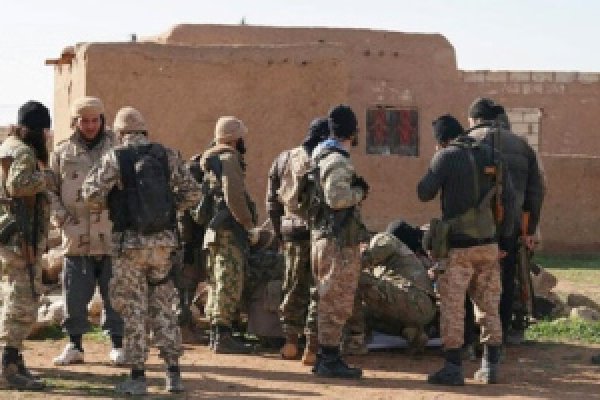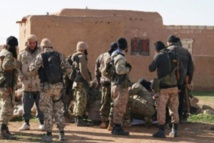Nearly 1,000 families have fled their villages in the northeastern province of Hasakeh since Monday's kidnappings, said Osama Edward, director of the Sweden-based Assyrian Human Rights Network.
About 800 of them have taken refuge in the city of Hasakeh and 150 in Qamishli, a Kurdish city on the Turkish border, Edward said, adding that the number of displaced people came to about 5,000.
Most of the hostages were women, children or elderly.
Edward said he believed the abduction was linked to the jihadists' recent loss of ground in the face of US-led air raids against IS that began in Syria in September.
"They took the hostages to use them as human shields," he told AFP.
The jihadists, who are battling Kurdish fighters on the ground, may try to exchange the Assyrians for IS prisoners, said Edward.
Their aim was to take the Assyrian Christian village of Tal Tamer, near a bridge that links Syria to Iraq, he said.
According to the Syrian Observatory for Human Rights, Kurdish fighters recaptured three Assyrian villages and a nearby Arab village Wednesday.
"The (Kurdish) People's Protection Units (YPG) have reclaimed Tal Shamiran, Tal Masri, Tal Hermel and Ghbeish," said Observatory director Rami Abdel Rahman.
But fighting continues in the area, he added.
- 'Brutal and inhumane' -
In Tal Shamiran, the jihadists burned down part of a church.
And in the Arab village of Ghbeish, IS decapitated four men, and burned down houses and a school. They accused the villagers of "collaborating" with the Kurdish fighters.
IS, which also holds swathes of Iraqi territory, last year declared an Islamic "caliphate" in areas under its control and has committed widespread atrocities.
The Assyrians, from one of the world's oldest Christian communities, have been under increasing threat since IS captured large parts of Syria.
Last week, the IS branch in Libya released a video showing the gruesome beheading of 21 Coptic Christians, mostly Egyptians.
Edward, a native of an area of Hasakeh province home to 35 Assyrian villages, said the jihadists broke into houses at night as people slept.
The hostages were then taken to Shaddadi, an IS provincial stronghold.
The jihadists had been intimidating the villagers for weeks, he said, including threatening to remove crosses from their churches.
"People were expecting an attack, but they thought that either the Syrian army, which is just 30 kilometres (18 miles) from there, or the Kurds or the (US-led) coalition's strikes would protect them," Edward said.
The United States condemned the abductions.
"ISIL's latest targeting of a religious minority is only further testament to its brutal and inhumane treatment of all those who disagree with its divisive goals and toxic beliefs," State Department spokeswoman Jen Psaki said, using another acronym for IS.
"To bring an end to these daily horrors, we remain committed to leading the international coalition to degrade and defeat ISIL."
Meanwhile, the Syrian Catholic archbishop of Hasakeh-Nisibi accused Turkey of allowing jihadists responsible for the persecution of Syrian Christians to cross its border unchecked, while preventing Christians from fleeing.
"In the north, Turkey allows through lorries, Daesh (IS) fighters, oil stolen from Syria, wheat and cotton: all of these can cross the border but nobody (from the Christian community) can pass over," Jacques Behnan Hindo said.
There were 30,000 Assyrians in Syria before the country's civil war erupted in 2011. At that point Syria had an estimated Christian population of about 1.2 million.
In other developments, an Australian who had travelled to Syria to join the Kurds has been killed in Hasakeh, the first Westerner to die fighting in their ranks, the Observatory’s Abdel Rahman said.
And three New York residents have been arrested for plotting to join jihadists in Syria and two threatened to carry out attacks within the United States, officials said.
------------------------------------------------------------------------------------------------------------------------------------
About 800 of them have taken refuge in the city of Hasakeh and 150 in Qamishli, a Kurdish city on the Turkish border, Edward said, adding that the number of displaced people came to about 5,000.
Most of the hostages were women, children or elderly.
Edward said he believed the abduction was linked to the jihadists' recent loss of ground in the face of US-led air raids against IS that began in Syria in September.
"They took the hostages to use them as human shields," he told AFP.
The jihadists, who are battling Kurdish fighters on the ground, may try to exchange the Assyrians for IS prisoners, said Edward.
Their aim was to take the Assyrian Christian village of Tal Tamer, near a bridge that links Syria to Iraq, he said.
According to the Syrian Observatory for Human Rights, Kurdish fighters recaptured three Assyrian villages and a nearby Arab village Wednesday.
"The (Kurdish) People's Protection Units (YPG) have reclaimed Tal Shamiran, Tal Masri, Tal Hermel and Ghbeish," said Observatory director Rami Abdel Rahman.
But fighting continues in the area, he added.
- 'Brutal and inhumane' -
In Tal Shamiran, the jihadists burned down part of a church.
And in the Arab village of Ghbeish, IS decapitated four men, and burned down houses and a school. They accused the villagers of "collaborating" with the Kurdish fighters.
IS, which also holds swathes of Iraqi territory, last year declared an Islamic "caliphate" in areas under its control and has committed widespread atrocities.
The Assyrians, from one of the world's oldest Christian communities, have been under increasing threat since IS captured large parts of Syria.
Last week, the IS branch in Libya released a video showing the gruesome beheading of 21 Coptic Christians, mostly Egyptians.
Edward, a native of an area of Hasakeh province home to 35 Assyrian villages, said the jihadists broke into houses at night as people slept.
The hostages were then taken to Shaddadi, an IS provincial stronghold.
The jihadists had been intimidating the villagers for weeks, he said, including threatening to remove crosses from their churches.
"People were expecting an attack, but they thought that either the Syrian army, which is just 30 kilometres (18 miles) from there, or the Kurds or the (US-led) coalition's strikes would protect them," Edward said.
The United States condemned the abductions.
"ISIL's latest targeting of a religious minority is only further testament to its brutal and inhumane treatment of all those who disagree with its divisive goals and toxic beliefs," State Department spokeswoman Jen Psaki said, using another acronym for IS.
"To bring an end to these daily horrors, we remain committed to leading the international coalition to degrade and defeat ISIL."
Meanwhile, the Syrian Catholic archbishop of Hasakeh-Nisibi accused Turkey of allowing jihadists responsible for the persecution of Syrian Christians to cross its border unchecked, while preventing Christians from fleeing.
"In the north, Turkey allows through lorries, Daesh (IS) fighters, oil stolen from Syria, wheat and cotton: all of these can cross the border but nobody (from the Christian community) can pass over," Jacques Behnan Hindo said.
There were 30,000 Assyrians in Syria before the country's civil war erupted in 2011. At that point Syria had an estimated Christian population of about 1.2 million.
In other developments, an Australian who had travelled to Syria to join the Kurds has been killed in Hasakeh, the first Westerner to die fighting in their ranks, the Observatory’s Abdel Rahman said.
And three New York residents have been arrested for plotting to join jihadists in Syria and two threatened to carry out attacks within the United States, officials said.
------------------------------------------------------------------------------------------------------------------------------------









 Home
Home Politics
Politics











